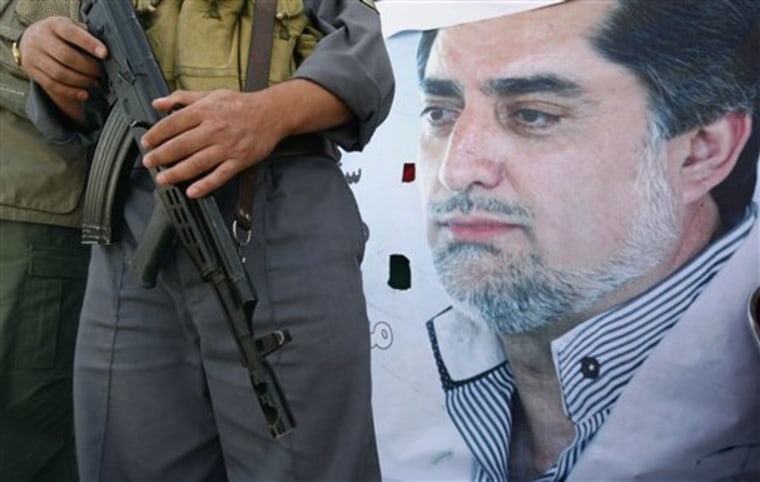Thousands of Afghans turned out to hear President Hamid Karzai speak at an election rally in northern Afghanistan. His top rival spoke to mostly empty seats in a cavernous tent in the capital.
The two events this past weekend reinforce the dominant story line of Afghanistan's second-ever presidential election: Despite all the complaints about Karzai's performance, the race is his to lose.
His main challenger among the three dozen candidates, former Foreign Minister Abdullah Abdullah, has pulled in surprisingly large crowds at some events outside the capital, raising hopes among his followers that he can find a way to beat the incumbent — possibly in a runoff if Karzai fails to win a majority in the Aug. 20 vote.
Still, Abdullah's showing in Kabul, the largest city, doesn't indicate the groundswell of support needed to topple Karzai. Although no recent polls are available, the incumbent is widely assumed to be the front-runner.
Turnout could be crucial in this ethnically divided, largely illiterate country, one-third of which is plagued by a thriving insurgency.
Hundreds of Afghanistan's 7,000 polling centers may not open in the violent south and east, closures that could cost Karzai large numbers of votes among his fellow ethnic Pashtuns. The Taliban have condemned the vote as a U.S.-orchestrated sham and may try to disrupt the balloting.
Elsewhere, more than 3,000 donkeys will deliver ballots to remote polling sites, ballots that identify candidates by a symbol to aid the 70 percent of Afghans who can't read.
'Room for uncertainty'
"The odds still favor Karzai, but there is plenty of room for uncertainty," said Ronald Neumann, the U.S. ambassador to Afghanistan from 2005 to 2007 who now serves as the president of the American Academy of Diplomacy.
"This is only the second presidential election in Afghanistan," Neumann said. "We have very little understanding of whether Afghans will vote outside the lines of ethnic and tribal groups."
A lot is riding on the election. U.S. officials hope a strong central government can better deal with the country's deteriorating security and help governance in far-off provinces. Although President Barack Obama has sent an additional 21,000 troops to Afghanistan this year, the conflict is almost eight years old and support for an indefinite military commitment is waning.
Karzai, who was once highly popular inside and outside Afghanistan, has lost luster in recent years because of endemic government corruption, unyielding violence and a huge narcotics industry. But his major challengers lack a broad base of support.
If he wins a second term, Karzai, 51, has promised to open negotiations with the Taliban to end the war and focus on building roads, improving education, boosting the economy and shoring up agriculture. Many of those goals are shared by other candidates. Abdullah, a 48-year-old English-speaking former ophthalmologist, has called for constitutional changes to bolster the role of parliament.
Enthusiastic crowds
The president has done minimal campaigning, and even skipped a televised debate last month between Abdullah and the third top contender, former Finance Minister Ashraf Ghani, a former finance minister and World Bank executive being advised by Democratic Party strategist James Carville.
Karzai has drawn enthusiastic crowds at the few events he has attended, including one in Baghlan province Saturday that drew thousands of Ismaili Shiites, some of whom traveled for hours on foot to hear the president.
His fellow Pashtuns make up 40 percent of the country — the largest voting bloc. Many analysts feel the bloc gives Karzai an insurmountable advantage, though militant violence could close polling stations and suppress turnout.
The Taliban last week urged Afghans to stay away from the polls and mocked the elections as an American "failed strategy." The statement urged Taliban fighters to prevent people from voting but didn't say specifically that militants would use violence.
Neumann said he did not expect many attacks, noting that the Taliban tried to stop the 2004 presidential vote but failed.
"There will obviously be some danger if the Taliban really try to stop the voting, but in my experience if people really want to vote they will do so," Neumann said.
Karzai opponent: Violence possible
Tajiks make up about 25 percent of the country. Though Abdullah's father was Pashtun, his mother was Tajik, and Abdullah was a former top official in the Northern Alliance — a Tajik-dominated political party and militia. Hazaras and Uzbeks each comprise about 10 percent of the population.
Abdullah last week courted ethnic Hazaras at two campaign events in Kabul, where his former Northern Alliance allies have had had considerable influence since the Taliban fled in 2001.
Some 3,000 Hazaras sat under bright orange sheets and listened to Abdullah rail Thursday against Karzai's administration and the country's insurgent violence, high unemployment and weak rule of law. The crowd applauded lightly and seemed lukewarm to the candidate.
On Sunday, Abdullah addressed about 500 Hazaras in a large tent configured to seat 1,500, meaning row upon row of the plush blue chairs were empty. The top Hazara leaders have already backed Karzai, making it difficult for the challenger to make deep inroads.
A key question is whether the loser and his supporters will accept the results.
Abdullah's campaign manager last week predicted street violence if Abdullah doesn't win, contending that Karzai can't prevail unless he steals the vote. Abdullah distanced himself from the comments, saying it wasn't his view or that of his supporters.
Threats of campaign violence — combined with several deadly attacks on candidates' campaign teams in recent days — are partial indicators that Afghans are not likely to view the election process as "credible and legitimate," said Candace Rondeaux, an Afghanistan expert for the International Crisis Group.
